Live-streamed content is captivating young audiences more than ever. Twitch, the world’s leading live streaming platform for gamers has proved there is a big market for watching other people play video games in real-time. On the other side, influencers that partner up with brands to promote different products is nothing new. However, presenting those products within a live stream and enabling viewers to purchase featured items is a real success, especially in Asian countries. This is where Live Stream Shopping and influencers can do the magic.
All posts tagged: followers
Articles related to in-person and virtual events
Creating a unique #hashtag for your event
In a previous article, when speaking about how you can use Twitter to promote your event, we recommended you to use the almighty event #hashtag in order to gain more visibility. Today I want to talk more about the #hashtag in particular, to see how and why you should create a unique one for your event.
But first, let’s remember what a hashtag is. Google dictionary informs us that it’s “a word or phrase preceded by a hash sign (#), used on social media websites and applications, especially Twitter, to identify messages on a specific topic”. In other words, it’s a searchable link used on social media platforms to categorize content, tying public conversation in one single stream.

Twitter was the first social media platform to use # as a searchable link. In 2007 user Chris Messina first brought it up on Twitter, but it took 2 more years before the feature went live. Twitter is not the only social platform to use the hashtag for grouping content anymore but it’s the platform where users use it the most, over 125 Million # being used every single day.
#hashtags are also used on Facebook, Instagram, LinkedIn (tested it, stopped using it, started using it again) Google+ or Pinterest. Even Snapchat users are using it, although on this platform it can’t be used as a searchable link.
What can I include in a hashtag?
Although I’m sure almost everyone knows how they look there is some specific information we need to know. Hashtags don’t support spaces, so if you want to to use multiple words you can use capitals to differentiate them (example: #ExperienceTech). Punctuation marks and special characters are not supported either but numbers are, so #WAM18 can be (and is) used as an event hashtag.
Why should I create an event hashtag?

source: Twitter.com
What would you say if I told you that one hashtag, #AIDubEBTamangPanahon, connected over 40 million tweets and comments in just 24 hours? Yes, this is a world record, but it’s a good example of how the snowball hashtag can roll, getting bigger and bigger.
Using the right hashtag (or combination of hashtags) will help you keep your followers close, and also reach new ones. Someone interested in your event will simply click on the hashtag and will “gain access” to all content where your # was used.
Your unique #hashtag can be used in combination with other ones in order to increase your reach but used wrong hashtags can also decrease it. These charts will show you the number of hashtags you should use on Twitter, Facebook, and Instagram for a better reach.
Twitter: it’s not recommended to use more than two hashtags per post.
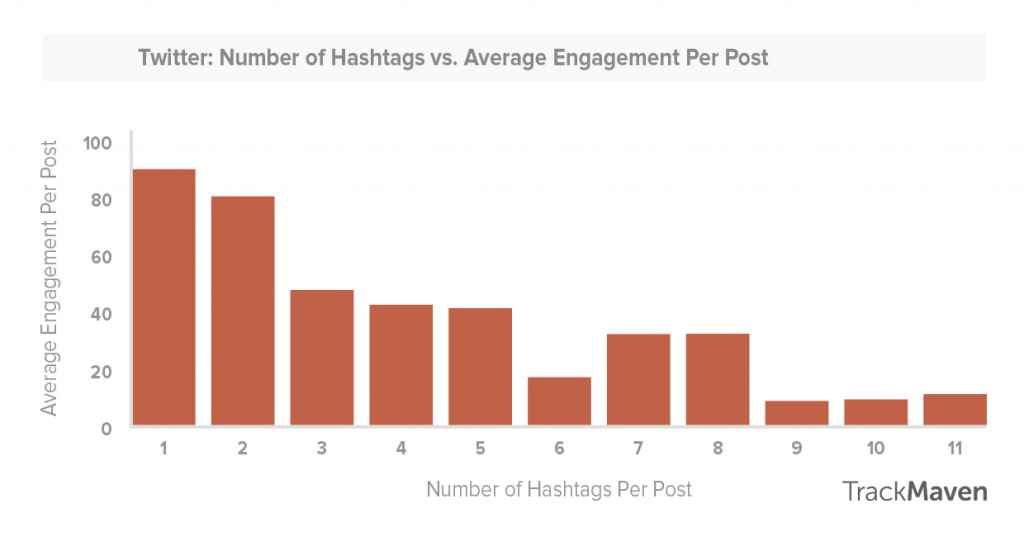
source: socialmediatoday.com
Facebook: don’t use more than 3 hashtags in one post.
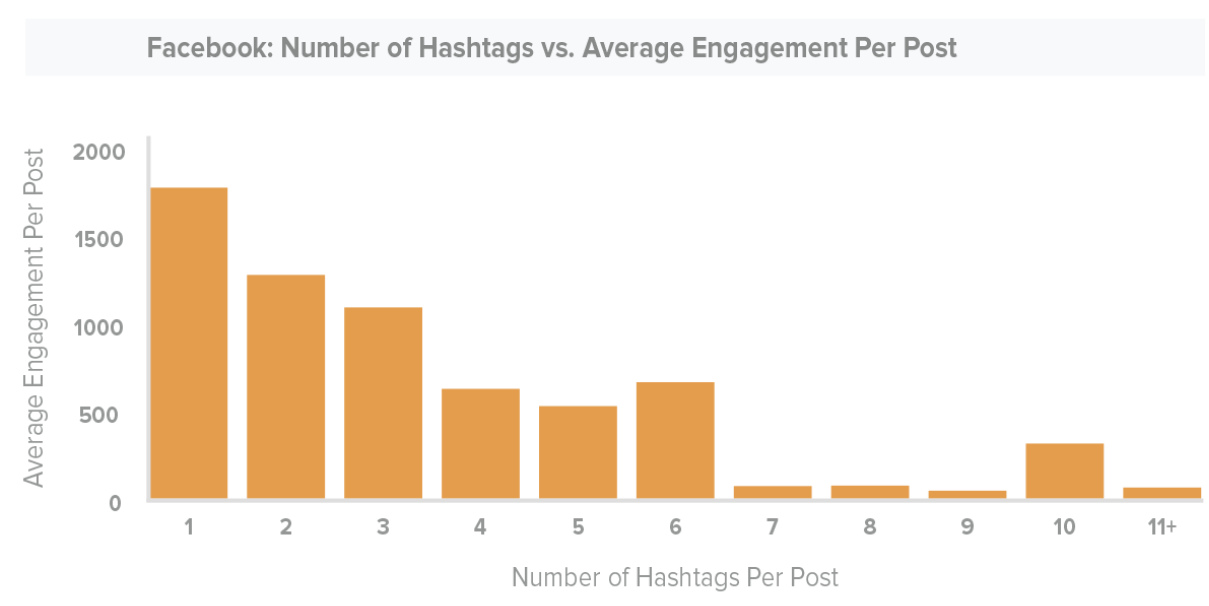
source: socialmediatoday.com
Instagram: Instagrammers love hashtags, so it seems that posts with 9 hashtags have the best engagement. But as you can see, the more the merrier.
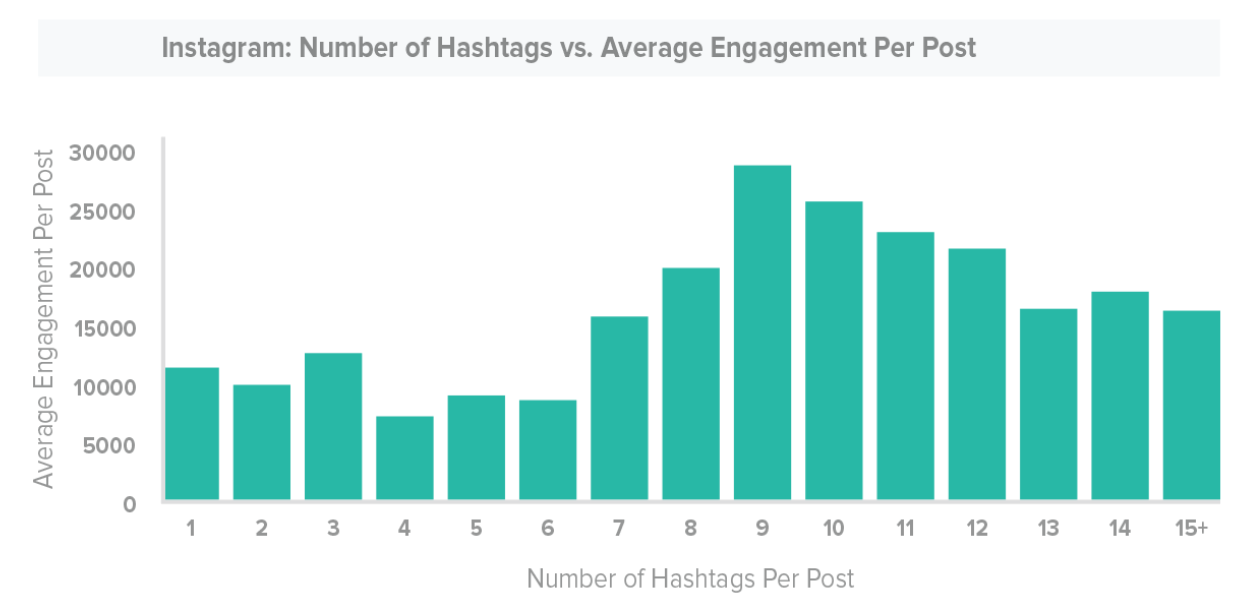
source: socialmediatoday.com
You can check out Socialmediatoday to find out more about the recommended length of a hashtag for this 3 social media platforms.
How should my event hashtag be?
Simple and easy to spell. Try keeping it as simple as possible, so people don’t find it hard to remember (or spell).The goal is to have it used as often as possible and a very complicated one won’t help you (yes, #AIDubEBTamangPanahon seems anything but simple, but why take the risk?)
Unique. Make sure that your branded hashtag wasn’t used by another company before (#eventplanning or not). You want your hashtag to be associated with your event, not with dog food (although let’s face it, dogs are damn cool).
Relevant. Don’t use a hashtag that might mislead users, it will backfire for sure. Use something that represents your event, like #ETA2017 for Event TEchnology Awards 2017 or #burningman for…well, guess this one.
P.s. you should also check your hashtags for double-meaning and also you should say it out loud before using it, it may save you a lot of trouble afterward.
How should I use my event hashtag?
Your mission is to create meaningful events and the event hashtag is closely connected to it, so I want to show you how to best use your hashtag before, during, and after your event(s).
Before the event: Before the event, you should use it to create a buzz around it. This way more and more potential attendees find out about it. For this, it’s best to ask all your partners to use the event hashtag. You can also create contests where the followers using your hashtag can win tickets to the event, backstage passes or any other event related prize. This way you will encourage people to use and share information about your event, meaning you will reach more and more potential attendees.
During the event: Experience taught us that attendees will post/tweet during events, letting their friends/followers know what a great time they are having. Or who they have just met.
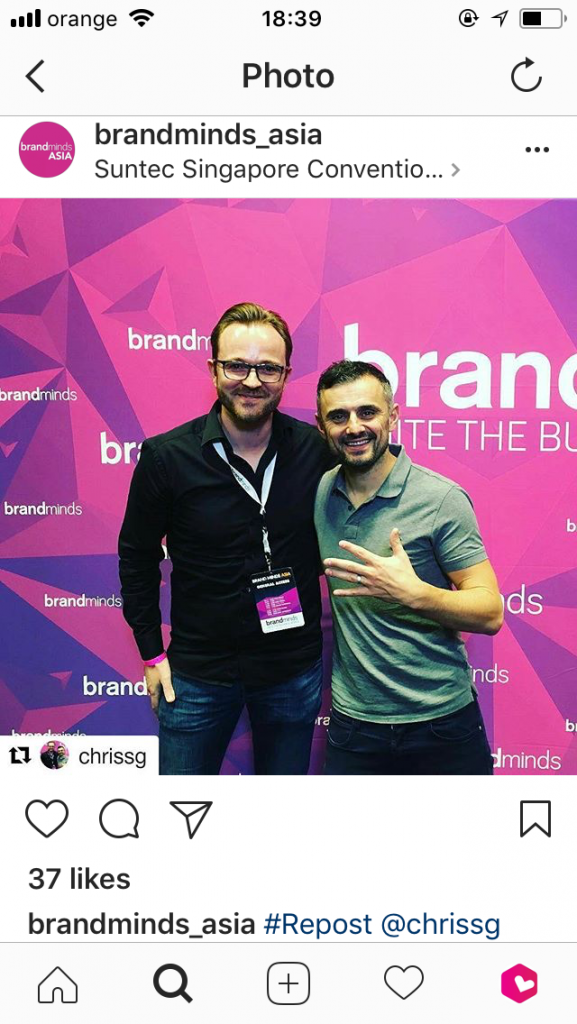
source: Instagram, brandminds_asia account
You can expand your reach by reposting (or retweeting) their content with your event’s “official” hashtag. You will also show your attendees that you appreciate their social media posting.
After the event: Being used as searchable links, hashtags are great when looking for user-generated content. And considering the fact that over 85% of the millennials say User Generated Content is a good indicator of the quality of a brand you should really use testimonials in your favor. Curated UGC can boost registration for your future events and your event hashtag is a great way to identify it.
How to use Facebook to promote your event management organization
“If you’re not on Facebook, you don’t exist.”
In my opinion, this is definitely false; I know many people who don’t have Facebook accounts and still have a very active social life (ok, maybe not so many, but I know quite a few). The real question is: it is possible for a business to exist without being present on Facebook? I don’t really know.
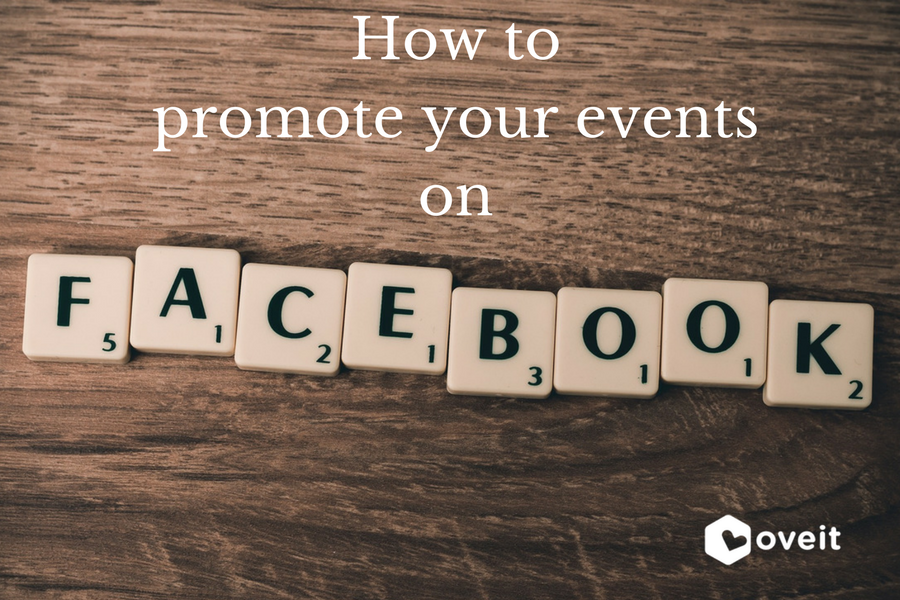
But the fact is that Facebook can be a real game-changer, offering access to over 2 billion people around the world.
And I think it’s great if you are an event planner because it helps connect with so many potential attendees. And it’s definetely useful when you decide to sell tickets online.
How to promote your event management business on Facebook? There are many ideas that could work so I am going to present you the basics of what you should do.
Create a page for your events.
Create a Facebook company page. It’s the first thing that you should do, although there are ways to promote your business on FB without actually having a page(but it will cost you). Facebook is sometimes used as a search engine so it’s in your best interest to offer relevant information for those looking. Use a relevant profile picture so people will recognize your brand and, very important, don’t let the “About” section blank.
Let’s say you plan a large annual music festival; use your logo as a profile picture, so people will associate your FB page with your festival from the first second. For the cover photo, a photo of people having fun at your events works great.
Share content
Although the number of followers that see your organic posts has declined in the last few years (so that you will need to put some money in it) it’s still important to share content on your page. Used as a search engine FB will redirect people to your page and a neglected one won’t do you any good. Create quality content for your followers but also use content created by your partners. Planning a festival? Share videos of the artist that will perform. Conference? I’m sure the main speakers would love it if you would share some of their viral posts. But remember that short posts with graphic content perform best on Facebook.
Frequency is important
As on all social media channels, FB also requires you to post with a certain frequency in order to stay “top of mind” with your followers. But be aware that posting too often can do you more harm than good. It seems that there is a tight connection between your number of followers and how frequent you should post (once or more times a day), you can find out more about this here.
Reward your followers
A great way to show appreciation to your followers is to set up exclusive promotions, only for them. Generate a discount code available for a certain period of time; offer free T-shirts to your most engaged followers; set up a contest with a substantial prize involved (I am not referring to the “like, share and tag” type of contests as I am not a big fan of them).
Create an event on Facebook
Another great way to create some buzz is by creating a public event on the platform. People can share public events, invite friends to attend and, most important, hit the “Interested” or “Going” buttons. This way the event will become visible to the FB friends of those that interact with it, helping you reach a greater number of possible attendees. Offer as many information as you can, as FB has an algorithm that recommends events to users based on interests and behaviors. While Facebook might be a great place to promote your event, you will most likely need an event registration software as well.
Promote your event with Facebook Ads
Facebook Ads are a great way to promote your events. Before starting a campaign you can select your goals for the campaign (as app installs, conversions, brand awareness, reach, traffic etc) and then the targeted audience. The really great part is that Facebook helps you define your audience by both geographical and demographical criteria. You can create your audience by location ( the city in which they live), sex, age, interest; you can choose if your Ads reach your followers and/or their friends. This is a great info that can increase your conversion rate if you use ads to sell tickets for your events (as new clients are more likely to buy tickets for events where their Facebook friends will attend).
P.s. as I said at the beginning of this article you can use Facebook without a page – with Ads that are linked directly to your website, but I think that it works better when you are present on the platform.
As said before, I don’t know if it is impossible for you to make it without being online. I really don’t. But I see on a daily basis how event management businesses use it to reach their attendees and sponsors. I see how technology offers you the chance to sell tickets all over the world and have instant access to your revenues. I see how it changes the whole world.
Updated 06.12.2021:
If you are a tech-savvy that is always looking for new ways to create memorable experiences we have great news! With Oveit, you can create, mint and sell NFT tickets for your events, allowing your attendees to actually own their part of the experience.